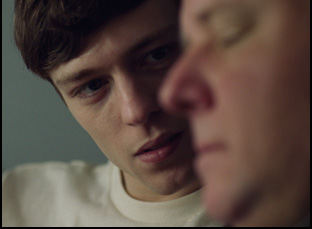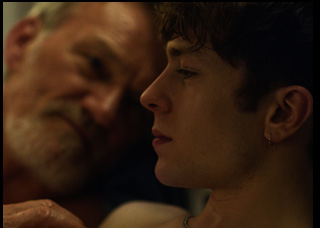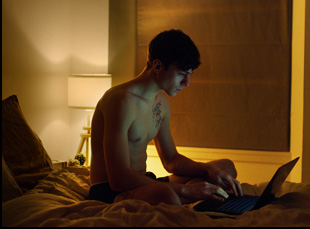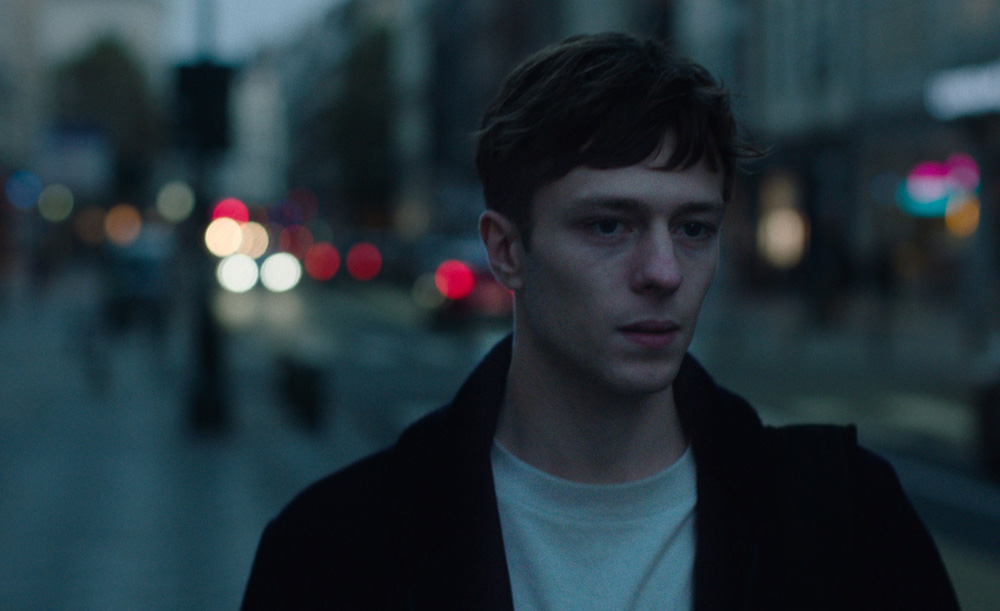When it comes to lived experience, there’s not much that “Sebastian” writer/director Mikko Mäkelä can say he shares in common with the 25-year-old author (Ruaridh Mollica) at the center of his second feature who feels compelled to start a side career in sex work for research on his latest novel, but what he could relate to was pitching the project to people who found it hard to look past its most salacious aspects.
“When you are making any kind of creative work not in a vacuum, but for an audience and dealing with executives and or financiers and kind of any other stakeholders or collaborators, everyone sees different things in the story,” says Mäkelä. “They might be looking for different emphasis and also get excited about different aspects of it as well, and as a writer and as a filmmaker, it takes some strength and willingness to really know what is the story that you want to tell as opposed to be able to stay in control of what you want to say.”
Mäkelä shows considerable command over what proves to be an especially wily tale set in London where Max, who rechristens himself as “Sebastian” for sexual encounters, has found considerably more work at night than attempting to place pieces during the day at the magazine where he’s an intern while working on his book project, but money isn’t the issue, experience is when he’s been culturally conditioned to believe that the worth of what he writes will be tied to what he witnesses firsthand. There is value to that idea when following him into bedrooms, he is able to see a side of society that typically remains behind closed doors and in the case of the gay community he serves, has often felt banished there, but a belief that he can only find truth in what he can personally attest to starts to show its limits when he finds himself in more extreme situations, emotionally as much as sexually, as he attends to clients who may have had a little too much thrown at them by life.
In that way “Sebastian” becomes more provocative for what it exposes than the considerable amount of skin it shows, finding Max wrestling with setting limits of what he should put himself through to get the details right. With a bracing performance from Mollica, the film considers the education Max is unaware he’s receiving as the personal and professional become dangerously intertwined to drain passion from both arenas and any freedom that he could enjoy in achieving his goal to be working fiction writer could be curtailed by an insistence on authenticity that prevents him from having much of an imagination. After making a splash earlier this year at Sundance, “Sebastian” is now arriving in theaters and recently Mäkelä spoke about sticking to his guns when shepherding a larger scale production than his debut “A Moment in the Reeds” that nonetheless felt just as intensely taut and getting at a truth beyond what could be substantiated with facts.

I really wanted to address how sex work, especially amongst the gay community, has become so commonplace in a city like London where the usage of apps and the internet has really made the threshold very low to step into it and for people to casually or more or less openly engage. And I also really wanted to focus on a character for whom sex work is out of choice and not because of financial necessity, and to combine that with a general reflection on the nature of storytelling, particularly in this kind of autofictional space. Conversations today are so much about authenticity of experience and whether someone has lived experience in whatever they’re writing or making work about, and I didn’t necessarily want to be giving answers that you should have lived experience or only use your imagination, but really [set the] stage [for] an examination of those questions about whether the need for lived experience or someone’s desire for that can then direct their life and their process of making art.
One of the things that Max brings up as part of his own goals as a writer that you demonstrate so well throughout the film was his idea of sex work as this generational transference between men that wouldn’t have encounters otherwise. How did that become a part of this?
From the start, I knew that whilst the focus of the film is so much on this sex worker character, I also I really wanted to approach the clients as well in a very humanizing way. In a lot of previous sex worker media, there’s often trauma behind the sex worker character or and we look at them pitifully, but then the clients can be reduced as well to to either just people to be pitied in some way or [presented as] antagonists and it was very important to recognize with each encounter that the people have different reasons for hiring a sex worker. A lot of times those arise from extremely human needs for connection and due to loneliness, but it was an interesting observation that I started to think about as well and heard from from people that that it is these encounters that that that do bring people together in a different way for which there might not really be a different forum.
With queer history, we think about the ways in which passing on traditions might differ within the queer community if things aren’t being transmitted in that patrilineal family line, I say like, like straight culture, so of course, you’re thinking about the kind of alternative modes of transmitting culture as well.

Yeah, even before this film, my work has featured a few intimate scenes and I always like to approach them from a point of trying to approximate this idea of touch or a sensual, multisensory way [where it’s] a slightly fragmented experience as well, approximating the sensation of sex. So for me, it’s very much about the montage in communicating those ideas and I definitely wanted there to be a an evolution from these maybe more confronting sex scenes at the beginning where we are holding the shot for longer and and the audience is maybe expecting for the scene to end [how it would] in a conventional film. But then I wanted to introduce, especially with the scenes with Nicholas, more of an emotional tenderness into those scenes, so I was definitely looking for an evolution there.
From what I understand, you had a year between casting Ruaridh and production to actually work with him – did any ideas about the character change?
With independent film, there are financing delays and and all kinds of things which actually worked out well in terms of preparation and really gave us gave us more time to keep discussing [the character] and going over the script and finding the meaning in every scene. I don’t think the the character arc or the character itself really changed, but after casting Ruaridh, I wanted to then make the character Scottish as well, which I think worked actually really well to further highlight this idea of him as a little bit of an outsider coming to London and feed into that idea of urban alienation.

Totally. The leap in terms of the production footprint was really big between these films, but what was really crucial and I recognize this as really, really important for myself was that I wanted to try to keep the experience for the actors and for myself as well as close to that 12-person crew of the first film, wherever possible. Obviously, we had bigger set pieces and we’d have dozens of extras in scenes and and it’s sometimes quite impossible to make the trucks disappear. But I really wanted to try to retain that same kind of feeling [as my first feature] because I think it’s so it’s so important for crafting performance and giving the actors that comfortable space without 50 people looking at them. Of course, for the [sexually] intimate scenes, we would have a closed set protocol and and all of that, but the ideal would be to have a so-called closed set through the shoot because you want that intimacy even just for a dialogue scene between two people. Why not?
What’s it been like to get this film out into the world?
It’s been great because this film took quite a quite a few years to make and we were a bit delayed by COVID as well, so it’s a story that I’ve been living with for so long, first in the writing, then in the making, and then in the edit room and it’s been a film I’ve made [with the intention] to ask questions and provoke discussions, so to get to that point has been lovely. What has been particularly meaningful is that after most screenings, there have been people, maybe not during the Q&A, but have have come up to me [afterwards] and said that they have experienced sex work or they or they know someone who is a sex worker and that the film really spoke to them and they felt represented and this felt authentic. That’s been really, really rewarding when the aim of of creating something truthful and authentic then has been reached.
“Sebastian” opens on August 2nd in Los Angeles at the Landmark Sunset, New York at the IFC Center and San Francisco at the Landmark Opera Plaza and will expand. A full list of theaters and dates is here.




